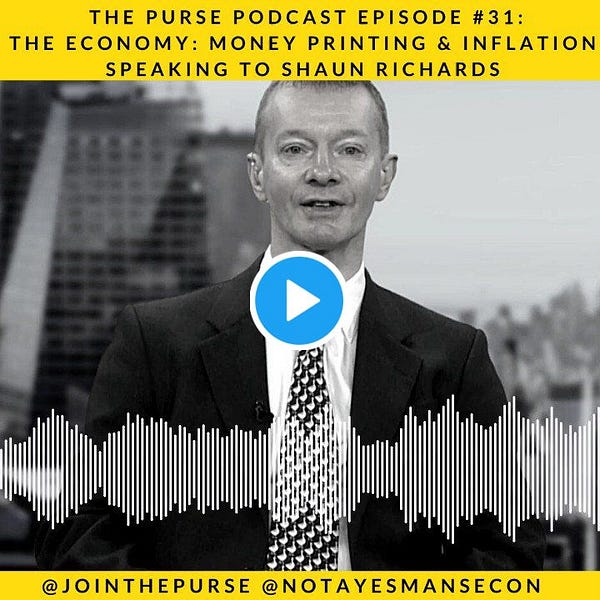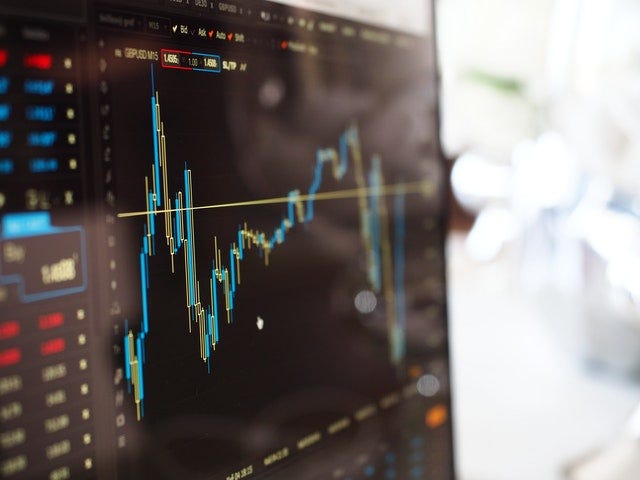Welcome to our #75 weekly newsletter.
“For women taking control of their financial future”
-Jana Hlistova
From The Purse
In this week’s newsletter, we focus on ‘green pensions’.
Based on recent data, most ESG funds have outperformed the wider market (over the last 10 years).
So how you can ensure that your money is aligned to your ESG goals as well as maximising returns?
Read the news in brief and stay on top of global financial, economic and investing trends.
And we explain what inflation is, how it is measured and why inflation is rising.
Importantly, we talk about how to hedge against it.
And don’t forget to listen to The Purse Podcast with Shaun Richards. We talk about the pandemic and the impact on the global, US and UK economy. And what this means for you and your money.
Stay safe everyone & look after yourselves.
I hope you enjoy this week’s newsletter.
Until next week,
Jana
‘Green pensions’: aligning your investment to ESG goals
Investing in sustainable businesses
Based on recent data, most ESG funds have outperformed the wider market (over the last 10 years).
And we know that the majority of women are interested in responsible investing.
However, many are unaware that their work pension or retirement fund may be propping up firms which do not align to their ESG (environmental, social and governance) goals.
This may include the fossil fuel industry or firms which are laggards in gender and racial diversity.
As reported by The Guardian, Rianna Gargiulo, a divestment campaigner at Friends of the Earth, said:
‘Most employees (or individuals) aren’t aware they are funding fossil-fuel companies. It doesn’t come to the top of people’s minds, and pensions are not straightforward. But there are more and more fossil-free funds available because people are starting to question it.’
Richard Curtis’ Make My Money Matter campaign…
… is pushing some of the £3 trillion in UK pensions to be moved into sustainable business. It wants all the funds to commit to net-zero carbon emissions, with a halving of emissions by 2030.
According to the campaign:
63% of savers don’t know where their pension is invested
44% of people would switch to a green fund if their provider offered it.
And the good news is that the UK government is behind ‘green pensions’
It just announced that the pension scheme trustees will be required to assess and report on the risks of climate change to their investments.
What can you do?
If you want to make a change, talk to your employer
Try to get the pension provider to change what they’re doing.
Make My Money Matter has a template email to send to your provider to encourage it to move to net zero.
If you’re not happy with your pension provider, you could shift to a self-invested personal pension (SIPP)-however employers are unlikely to contribute to a SIPP.
News in Brief
Financial news
US President Joe Biden announces infrastructure deal, after meeting with a bipartisan group of senators. The framework will include $579 billion in new spending.
US: the S&P 500 rallied 2.7% for the week; its biggest weekly gain since early February. Investors are betting that inflation is temporary, as the economy continues to recover (from the pandemic).
US Fed balance sheet expansion beyond the $8tn mark. Fed balance sheet now equal to 37% of US's GDP vs ECB's 78%, BoJ's 134% or #SNB's 145%.
Apple, Microsoft, Amazon and Alphabet are all at or near a $2tn valuation. Facebook is likely the next member of the trillion dollar club.
Bank of England (BoE) voted 9-0 to hold to maintain bank rate at 0.1%. Voted 8-1 to keep bond buying plan unchanged at £875bn. BoE says inflation likely to rise 3%+ but insists inflation surge is temporary.
Brits are hoarding more cash than 16 other countries during the pandemic.
Crypto: bitcoin, ethereum & DeFi
Total cryptocurrency market cap is down from $2.5 trillion in May to approximately $1.38 trillion.
Bitcoin price has fell below $30,000 and is now at $33,000. Bitcoin charts show the price 50-day moving average has fallen below the 200-day moving average-a pattern known as the ‘death cross’.
(Monday) Bitcoin tumbled 11% after China steps up crackdown on crypto mining and financial operations. (Ether price fell 6%, currently it is trading at $1800+)
Coinbase cofounder Fred Ehrsam has warned ‘most’ cryptocurrencies and crypto-assets ‘won't work’ and ‘90% of NFTs’ will have ‘little to no value in three to five years.’
MicroStrategy buys $500bn of bitcoin as the market fell. It now holds 105,085 bitcoin, worth about $3.3bn at current prices. Michael Saylor (CEO), at the same time predicted bitcoin’s market cap would reach $100tn.
Explainer: rising inflation and what does this mean for your money?
What is inflation and how do we measure it?
Inflation around the world is rising much faster than expected.
In the US, inflation has jumped to 5% in May (from 4.1% in April) which is the biggest jump since 2008.
Inflation in the UK rose to 2.1% in May (exceeding the Bank of England’s target of 2%). And in its latest statement, the Bank's Monetary Policy Committee (MPC) said that inflation will rise to 3%+ (although they anticipate this to be temporary).
However, according to Resolution Foundation inflation (UK) is on course to rise to 4% (in the next few months) as the economy opens up and consumers begin to spend.
What is inflation?
There are two ways of defining inflation.
One relates to an increase in money supply (all the currency and other liquid instruments in a country's economy on the date measured).
And the other relates to the continuous rise in consumer prices (referred to as the consumer price index ie CPI).
Deciding what to include in the measure of inflation or CPI is a much debated topic. For example, whilst rent is included in the CPI, house prices are not, even though buying property makes up a significant amount of an individual’s spending or consumption.
Therefore does the CPI accurately reflect the real rate of inflation?
If we assume that house prices have gone up by roughly 10% since May 2020, the UK inflation rate should be closer to 5%-6% versus the 2.1% (based on a rough calculation).
Why is inflation rising?
In order to limit the damage to the global and UK economy because of the pandemic, central banks have been printing money (also referred to as quantitative easing (QE)). In other words, the central bank has been buying government and corporate bonds.
The Bank of England is maintaining its bond-buying target at £895bn.
This acts in a similar way to cuts in Bank Rate. It lowers the interest rates on savings and loans. And that (should, in theory) stimulate spending in the economy.
UK money supply has increased 11% in the last year.
Consumer prices have been rising as the recovery around the world has been stronger than expected. The price of fuel and the cost of clothing, meals and pub and restaurant drinks also helped drive up prices.
Supply chain disruption and a shortage in labour is pushing prices up further. Wage increases attracts people back into work, but this drives up costs which may be passed on to consumers.
However, it is not clear whether this rise is part of a new trend-we are in unchartered territory.
What does this mean for your money?
Wages have gone down in the last ten years as inflation continues to go up.
Ray Dalio, the US billionaire and hedge fund manager, often says that ‘cash is trash’ because cash loses its value over time due to inflation.
This is is why cash in a savings account is eroding the value of your money in a low interest and inflationary environment.
Low interest rates encourage households and businesses to seek higher rates of return by investing in shares and property, which pushes up prices in those assets.
For individuals who own assets such as stocks, property and cryptocurrency (eg Bitcoin), rising asset inflation is making people wealthier.
For example, if your property was valued at £400,000 last May, it is worth £440,000 today (ie it has gone up by the 10% rise in house prices (excluding other expenses)).
In theory, this is good news for assets owners. However it is less so for individuals who do not own any assets or are trying to get onto the property ladder.
It also means that the wealth inequality divide is becoming much bigger.
Here’s how you can you protect yourself from rising inflation:
Hedge against inflation by investing (and beat the rate of inflation).
Move your cash ISA to a stocks & shares ISA.
Invest in your pension (add to your monthly contributions or set up a self-invested personal pension (SIPP)).
Invest your money in assets that will grow your wealth over time (for example, invest in stocks, index funds, ETFs (passive or active), art, gold, vintage wine, property, bitcoin).
Speak to a financial advisor.
The Purse Podcast


The pandemic & the impact on the global, US & UK economy
We cover the following in our conversation:
What is the impact of the pandemic on the global, US and UK economy & the stock market? Should we be worried?
What is money printing?
Government debt is rising-how are we going to pay that back?
Low interest rates & rising inflation
Unemployment & productivity
Innovation
Would you rather buy a bitcoin than a bond?
Listen on all podcasting channels including iTunes, Spotify.
Coffee Break? Read This
We’d love to hear from you. Get in touch with Jana via the The Purse website or tweet @jointhepurse and @janicka.
The Purse Ltd. Copyright 2021 & All Rights Reserved.
The Purse provides content for informational purposes only, we do not provide product or service recommendations or investment advice. Please do your own research or speak to a financial advisor.

















Share this post